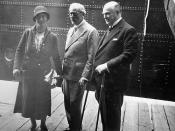An unreliable narrator is a first-person narrative, who explicitly refers to themselves in the first person. The credibility of their point of view is seriously compromised, possibly by psychological instability or bias. Without realising it, characters may change a conversation they previously had in order to put their views across to the audience. They are not necessarily lying; they may have just interpreted the conversation in a different way.
Bennett has deliberately created these characters to be unreliable. In his 'Talking Heads' monologues Bennett gives us one death, one imprisonment, one brush with mental illness, one descent into poverty. The characters posses many similar qualities, their lives can be viewed as mundane and dull. Using dramatic monologue, Bennett is able to explore the different aspects of life, while also making it easy for the reader to understand and ultimately appreciate the themes beneath the surface. The monologue style enables the reader to hear the biased views of the narrator.
Alan Bennett provides readers with clues during the monologues, helping the reader to discover discrepancies in the narrator's story, by allowing the narrator to divulge information accidentally; this information however, may not become apparent until the narrative is well underway. Many of Alan Bennett's characters do not entirely understand themselves; he describes them as being "artless".
Bennett uses Irene's acting to indicate her personality as well as the use of her clothes and her surroundings. For example, mid-way through the second sequence, Irene says
"She can't be more than twenty and by the look of her she's expecting another".
When saying this, Irene gave the audience a look of disapproval. They realised that Irene not only knew a great deal about the history of the people on her road, but is also aware instantly of any change that they go...


